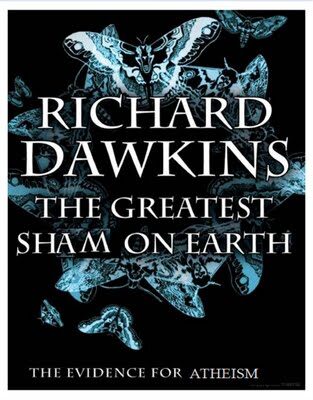We now continue and conclude considering Richard Dawkins’ new book The Greatest Show on Earth which is a book calling for conversion to atheism while preaching the death of God—wrapped around a very thin veneer of “science.”
Richard Dawkins also traipses into the arena of arguments that Darwin-equals-no-God (“Evolutionary Theodicy”) evolutionists should not use in seeking to identify poor design. This is basically an updated version of what used to be evolutionist arguments about vestigial organs. People actually had certain organs removed from their bodies even though the organs were perfectly healthy because, and here is the key, the evolutionists de jour declared them useless in humans as they were mere leftovers from our evolutionary past.
Note Dawkins’ presuppositions (emphasis added):
the overwhelming impression you get from surveying any part of the innards of a large animal is that it is a mess! Not only would a designer never have made a mistake like that nervous detour; a decent designer would never have perpetuated anything of the shambles that is the criss-crossing maze of arteries, veins, intestines, wads of fat and muscle, mesenteries and more…
I think it would be an instructive exercise to ask an engineer to draw an improved version of, say, the arteries leaving the heart. I imagine the result would be something like the exhaust manifold of a car, with a neat line of pipes coming off in orderly array, instead of the haphazard mess that we actually see when we open a real chest (p. 371)
How does he know that it is a mess? Because it looks messy? But to what is he drawing that comparison? Given the functions of the organs, etc. throughout the organism’s entire lifespan; how does he know what a designer would never do? How does he know that it is a mistake? How does he know that it is an, apparently, useless waste of a detour? How does he know what a decent designer would and would never do if she were designing actually living and lifelong functioning bio-organisms?
How does he know that the criss-crossing maze is a shambles?
Well, he gives us the answer: it is because he can “imagine the result” based on what he imagines an engineer would “draw.” Imagination is not an organism which functions throughout a lifetime. A drawing is not an organism which functions throughout a lifetime. This is the very issue; since he has spent his entire career weaving Victorian Era tall tales, imagination and imagining what a drawing would look like if such as drawing were ever drawn is good enough—he is intellectually satisfied. However, I wonder, what if I would criticize the design of the exhaust manifold of a car. Why this neat line of pipes when you could make nice curves? Why this length and not shorter? Why have the pipes travel all the way to the back of the car? Etc. We could “why” the design to death and yet, keep in mind that there are very good answers, very good reasons for shape, length, location, etc. Likewise, there may be very good reasons even if Dawkins does not know them.
Keep in mind Richard Dawkins’ faith based statements about natural selection as he presented his “most persuasive” argument:
Um, there’s got to be a series of advantages all the way in the feather. If you can’t think of one then that’s your problem, not natural selection’s problem. Natural selection, um, well, I suppose that is a sort of matter of faith on my, on my part since the theory is so coherent and so powerful.[1]
Once upon a time Pandas were perfectly happy stripping off bamboo leaves from branches by pulling the branches thought their “thumbs.” But then a man named Stephen Jay Gould told them that their thumb was evidence of poor design. But the Pandas were not bothered in the least bit as they went on utilizing their “thumbs” just as well as ever.
Dawkins asks,
Why would the designer not borrow that ingenious invention, the feather, for at least one bat? (p. 297)
How is this even a question? Forget bats; how about giving me some feathered wings, some cheetah legs and a prehensile tail while you are at it. To Dawkins another sign of “obvious stupidity” is the eye,
Once again, send it back, it’s not just bad design, it’s the design of a complete idiot (p. 354)
Obviously, scientific concerns are far behind him and this is merely an anti-God tirade. I know plenty of engineers and on occasion I will ask them something like, “Why would someone design this certain machine like this? I mean, why not put that there and this here?” And just as often they point out things that I did not know, “Well, if you put that there then you create a structural weakness and this is here because it does that…”
The reason that arguments for (yes, “for” and not “from”) poor design should not be used are, at least, threefold: 1) Without knowing the complete, ultimate purpose we cannot claim that the design is poor. 2) Just because we can imagine, literally merely imagine, a better design this does not mean that it is a better design nor that we have taken into consideration how the organ, function, etc. is utilized at every single stage of the organism’s life.
3) What happened to claims of vestigial organs is that as science progressed their functions were discovered and they were functioning perfectly well. Many claims of poor design have already been shown fallacious. Thus, such claims are momentary shouts of triumph which are constantly being hushed.
On a theological point: Dawkins defines “creationism” as basically North American YEC. Yet, while recognizing the YEC’s theological position on some matter he denies the theology of the fall into sin, corruption and entropy. I wonder if it may be argued that poor design, if there is any, could merely be the devolution of the original design.
Another issue which is generally handled via theology is the problem of evil, pain and suffering. I argue that if you reject God due to evil, pain and suffering you will find that the moment you do so you will look around and notice that evil, pain and suffering are still alive and well—and now you do not even have God to blame anymore. Dawkins writes,
Evolutionary biologists see no problem, because evil and suffering don’t count for anything, one way or the other, in the calculus of gene survival. Nevertheless, we do need to consider the problem of pain. Where, on the evolutionary view, does it come from? Pain, like everything else in life, we presume, is a Darwinian device, which functions to improve the sufferer’s survival (p. 393)
Or, as he had previously stated it,
nature is not cruel, only pitilessly indifferent. This is one of the hardest lessons for humans to learn. We cannot admit that things might be neither good nor evil, neither cruel nor kind, but simply callous—indifferent to all suffering, lacking all purpose.[2]
We are back to evolution is everything and everything is evolution. If it is, then evolutiondidit. If “A” and not “B”—evolutiondidit. What? Now we find that “B” and not “A”—evolutiondidit.
That “Pain…is a Darwinian device, which functions to improve the sufferer’s survival” is the very reason that atheists such as Sam Harris argue that rape played a beneficial evolutionary role in our development (see here for his and other atheist’s very odd statements about rape). Perhaps, in places of low populations it will make a beneficial come back.
Understand that theodicy-evolutionists solved the problem of evil by, essentially, stating, “What evil?”
Evil, pain and suffering are merely a part of nature, and a beneficial part at that. This was my point in my essay Darwin’s Chaplain; if God is, then the parasitic wasp is evil but if God is not the very same wasp doing the very same thing just is—and beneficial so.
Now, since, as per theodicy-evolution, nature is all that there is and theodicy-evolution sees no problem with evil, pain and suffering—not only sees no problem but considers them beneficial—why not cause do “evil,” (whatever that mean in this view) and cause pain and suffering? Because…and here come the virtual tel of assertions as to why not; which may be fine reasoning but amounts to the impotence of a bio-organism who chose to hold such opinions.
But again, even granting the very best reasons for not causing evil, pain and suffering; what if I argue that since nature is all that there is and in nature evil, pain and suffering are beneficial I seek to benefit from evil, pain and suffering? Oh no, no! It is at this point that Dawkins becomes “anti-Darwinian.” But why? Because he is a “cultural-Christian.” Understand that he urges rebellion against Darwinism with regards to morality because it is morally better to do so—note the circular logic. There is no basis, there are mere infinite circles. This is because he follows Darwinism only to a certain point but does a u-turn when he sees its end and so he turns and heads towards Judeo-Christian principles but only to a certain point but does a u-turn when he sees its end and so he turns and heads towards Darwinism…he is stuck going in circles.
Yet, beyond this, Dawkins goes from employing evolution as supporting, or causing, theodicy (and then he is shocked that theists don’t believe in evolution) to call for converts,
Yes, there is grandeur in this view of life, and even a kind of grandeur in nature’s serene indifference to the suffering that inexorably follows in the wake of its guiding principle, survival of the fittest (p. 401)
Jeffrey Dahmer, the convicted murderous cannibal, fully embraced this grandeur in this view of life along with the benefits of evil, pain and suffering and knowing that of nature’s serene indifference:
If a person doesn’t think there is a God to be accountable to, then…what is the point of trying to modify your behavior to keep it within acceptable ranges? That’s how I thought…I always believed the theory of evolution as truth, that we all just came from the slime.[3]
More likewise statements are found in my essays on atheism, meaning and purpose.
Does malevolence necessarily follow from theodicy-evolution? No. Does benevolence? No. Human beings learn that in nature evil, pain and suffering are beneficial and then make choices in whichever direction they want. As Dan Barker stated it so very well during his debate with Paul Manata,
There is no moral interpreter in the cosmos, nothing cares and nobody cares….what happens to me or a piece of broccoli, it won’t [matter], the Sun is going to explode, we’re all gonna be gone. No one’s gonna care.
Overall and sadly, The Greatest Show on Earth is yet another attempt a theodicy in the guise of science which will be very effective in turning off the very Holocaust deniers which Richard Dawkins seeks to convert to atheism.
Since Dawkins began to believe in “evolution” at the age of 16 because “I was taught it” it has always been about theodicy to him and I am not certain that he has ever been able to function as an unbiased biologist.
[1] The Atheism Tapes, Part 4: Richard Dawkins and Jonathan Miller
[2] Richard Dawkins, River Out of Eden – A Darwinian View of Life (New York, NY: Basic Books, 1995), p. 96
[3] During an interview with Stone Phillips, Dateline NBC, 11/29/1994


